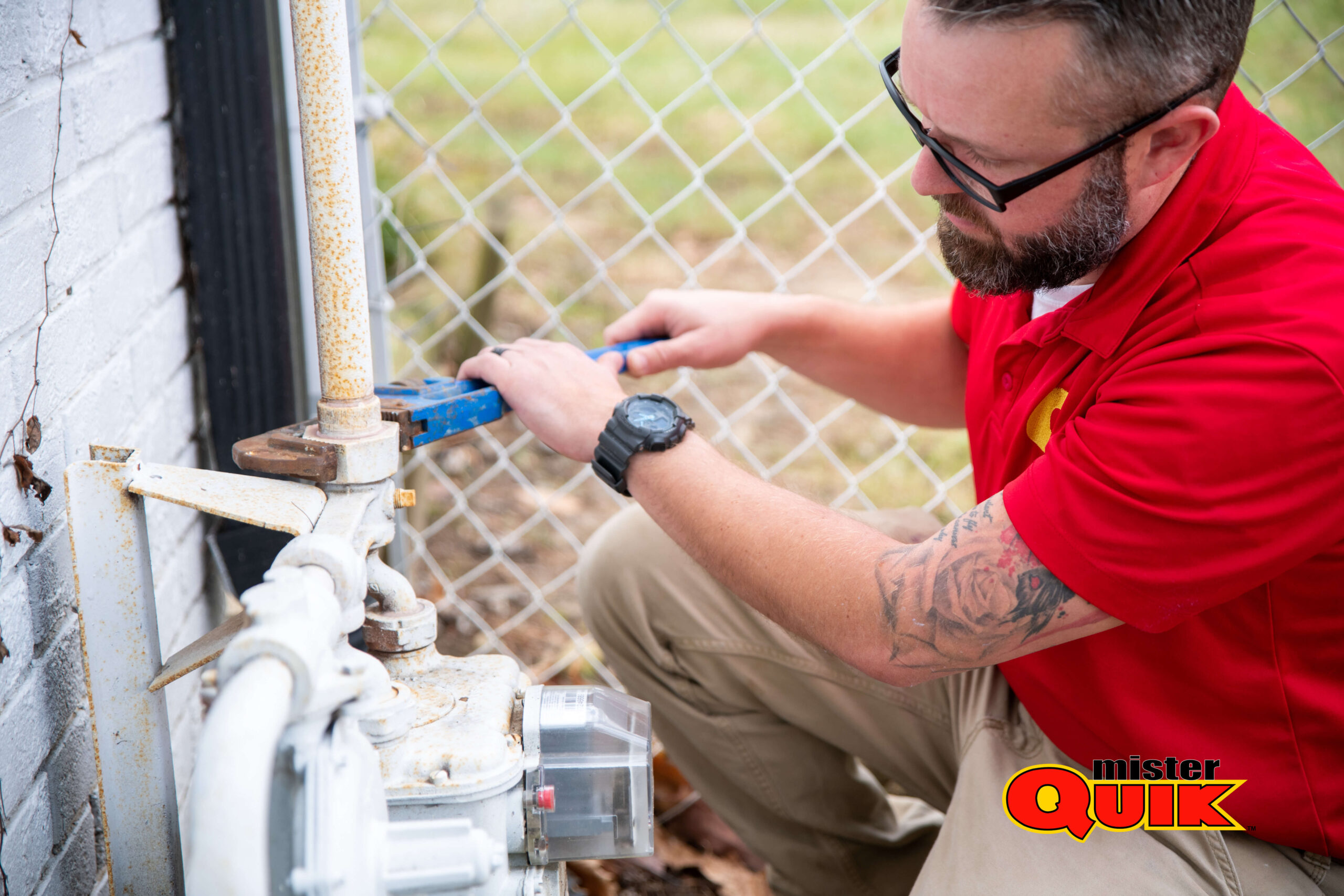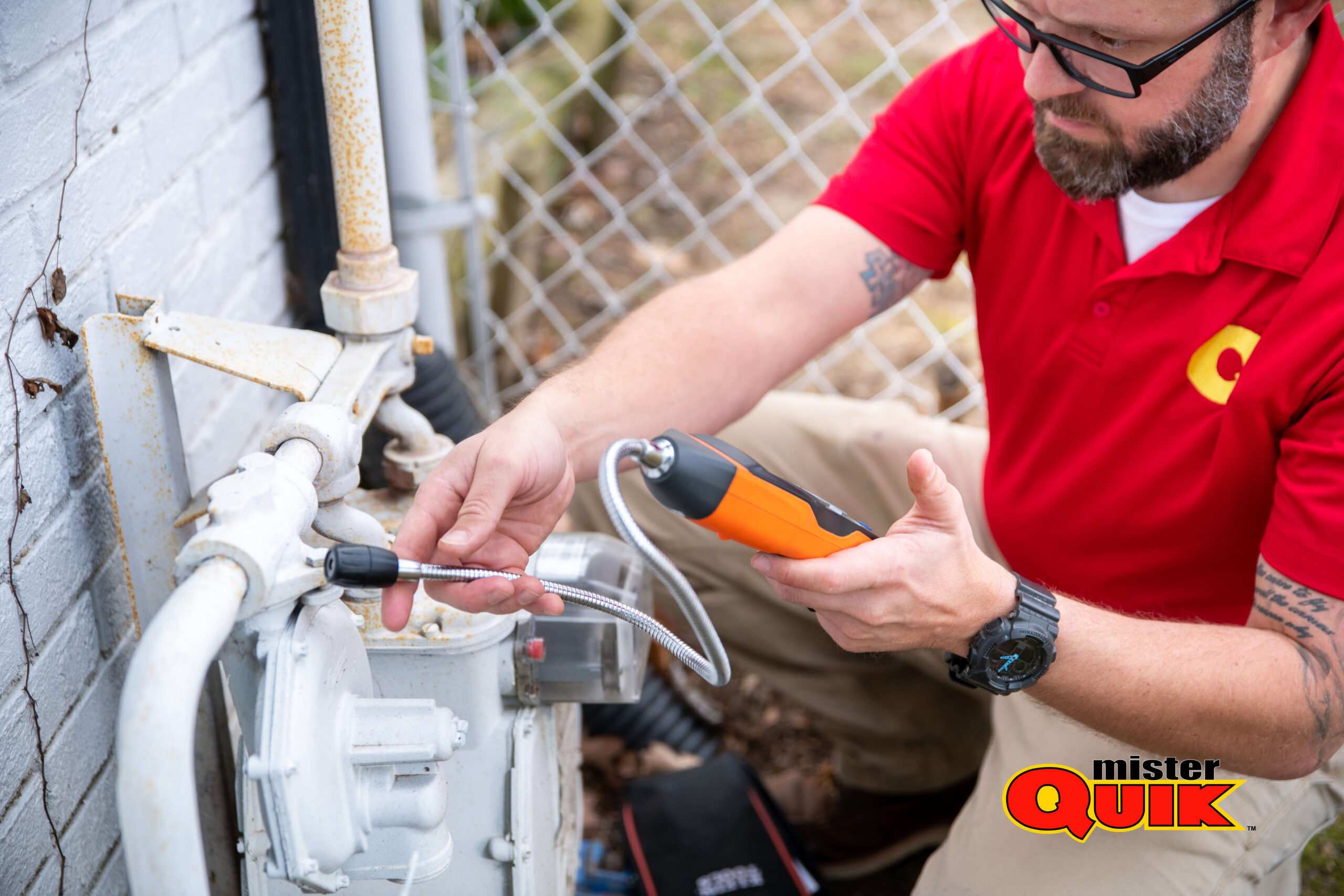Bloomington Gas Line Repipe

Residential Gas Line Repipe
Natural gas is a convenient and efficient fuel for many Bloomington homes, powering everything from furnaces and water heaters to stoves and fireplaces. However, like any other part of your plumbing system, gas lines can deteriorate over time, posing potential safety risks. This guide explores the ins and outs of Bloomington gas line repipe, helping you understand when it might be necessary and what the process entails.
Signs You Might Need a Gas Line Repipe:
- Age of your home: If your Bloomington home was built before the 1960s, the gas lines could be made of galvanized steel, which is susceptible to rust and corrosion.
- Suspicious odors: A strong odor like rotten eggs can indicate a gas leak. If you smell gas, evacuate your home immediately and call 911 from a safe location.
- Discoloration around the gas meter: Rusty or brown water stains around the gas meter could signal a leak underground.
- Hissing sounds: Listen for any hissing noises near your gas appliances or gas line, which could indicate a leak.
- Higher gas bills: Unexplained spikes in your gas bills could be due to leaks, as unburned gas is escaping the system.
What to Expect During a Bloomington Gas Line Repipe:
- Contact a licensed plumber: This is crucial for ensuring the work is done safely and according to local codes.
- Inspection and permit: The plumber will inspect your existing gas lines and advise on the best course of action. They will also obtain the necessary permits from the city of Bloomington.
- Shutting off the gas: The gas supply to your home will be temporarily shut off for safety reasons.
- Gas line removal: The old gas lines will be carefully removed, following all safety protocols.
- New line installation: Depending on your specific needs and the plumber’s recommendations, new and safer materials like copper or CSST (corrugated stainless steel tubing) will be installed.
- Testing and inspection: Once the new lines are in place, the plumber will thoroughly test them for leaks and ensure everything is functioning correctly.
- Gas meter re-light: The gas supply will be restored, and the plumber will relight your gas appliances.
Remember: Gas line work is a serious undertaking and should only be performed by licensed and qualified professionals. Never attempt to work on gas lines yourself.
Additional Tips:
- Regularly schedule gas line inspections by a qualified plumber to identify and address any potential issues early on.
- Install carbon monoxide detectors in your home. These devices can save lives by alerting you to the presence of this odorless and poisonous gas, which can be a symptom of a gas leak.
- Know how to shut off the gas supply to your home in case of an emergency. This information is usually located near the gas meter.
By understanding the signs of potential gas line problems and being proactive with inspections and maintenance, you can help ensure the safety and well-being of your family and your Bloomington home.
What Pipe to Use for Gas Line
Upgrading your home’s gas lines is a crucial project, ensuring safety and maximizing the lifespan of your gas appliances. But when it comes to the actual piping material, you might find yourself facing a confusing array of options. Fear not, Bloomington homeowners! This guide will shed light on the different types of gas lines and help you choose the most suitable one for your repipe project.
A classic choice known for its strength and durability. This sturdy metal pipe withstands high temperatures and resists corrosion, making it a popular option for both indoor and outdoor use. However, black iron requires professional installation due to the specialized threading and welding involved.
This flexible option offers excellent maneuverability, making it ideal for navigating tight spaces and avoiding obstacles. It's generally used for connecting individual gas appliances due to its ease of installation. However, CSST has specific installation requirements and might not be permitted in all areas, so it's important to check local regulations.
This plastic piping boasts impressive flexibility and resistance to corrosion and chemicals. It's primarily used for underground gas lines due to its ability to withstand harsh weather conditions and shifting soil. However, working with HDPE requires specialized equipment and training, making professional installation essential.
If navigating tight spaces or avoiding obstacles is crucial, CSST might be your champion. However, if rigidity is preferred, black iron is a solid choice.
If a gas line leaks, it can pose serious safety hazards and health risks. Gas leaks can lead to the buildup of flammable gas in enclosed spaces, increasing the risk of fire or explosion. Additionally, inhaling gas fumes can cause symptoms such as headaches, dizziness, nausea, and respiratory irritation. In severe cases, prolonged exposure to high levels of gas can result in loss of consciousness, asphyxiation, or even death. Gas leaks also contribute to environmental pollution and can damage property and infrastructure.
Generally, gas pipes made of materials like steel or iron can have a lifespan of 20 to 50 years or more, depending on factors such as corrosion resistance and exposure to moisture, chemicals, or soil conditions. Modern gas pipes made of materials like polyethylene (PE) or corrugated stainless steel tubing (CSST) may have longer lifespans due to their resistance to corrosion and other environmental factors. However, it’s essential to periodically inspect gas pipes for signs of wear, corrosion, or damage and replace them as needed to ensure the safety and integrity of the gas distribution system.
The cost of a gas pipe change can vary widely depending on factors such as the length of the pipe, the complexity of the installation, the type of pipe material, and local labor rates. On average, homeowners can expect to pay anywhere from a few hundred to several thousand dollars for a gas pipe replacement. Additionally, factors such as permits, excavation, and any necessary repairs or modifications may also affect the overall cost.
Signs of a bad gas line include the distinct smell of gas, resembling rotten eggs, which warrants immediate evacuation and contacting emergency services; hissing or whistling sounds near the gas line or appliances; visible damage such as corrosion, rust, or leaks; dead or discolored vegetation above underground pipes; and health symptoms like headaches, dizziness, nausea, or respiratory irritation.
Yes, a rusty gas pipe should be replaced to ensure the safety and integrity of the gas distribution system. Rust on a gas pipe indicates corrosion, which weakens the pipe and increases the risk of leaks or failures. Even small leaks can lead to gas buildup in enclosed spaces, posing a serious fire or explosion hazard. Additionally, rust can contaminate the gas supply, affecting the performance and efficiency of gas appliances.
Gas Line Repipe Replacement
Natural gas is a wonderful resource for our homes, providing heat, hot water, and even powering some appliances. But like any essential system, the gas lines that deliver this fuel can deteriorate over time. This raises the question: when should you consider a Bloomington gas line repipe?


Imagine the gas lines in your home as the veins that carry natural gas. These pipes are typically made of black iron or galvanized steel, materials that can last for decades. However, with age, exposure to elements, and even normal wear and tear, they can become vulnerable to:
- Corrosion: This is the gradual breakdown of the metal, causing leaks and weakening the pipes.
- Leaks: Even small leaks can pose a serious safety hazard, as natural gas is odorless and colorless, making it difficult to detect.
- Sewer Line Crossings: If your gas lines run near sewer lines, there’s a risk of harmful gases seeping into your home through cracks in the pipes.
While professional inspections are crucial, here are some signs that might indicate the need for a Bloomington gas line repipe:
- Visible damage: Rust, cracks, or pinholes on the exposed parts of your gas lines.
- Smell of gas: This is a serious sign and requires immediate action. Evacuate your home and call the gas company from outside.
- Hissing sounds: This could indicate a leak somewhere in the system.
While repairs might be an option for minor issues, a complete repipe offers several benefits:
- Enhanced safety: Replacing your gas lines with stronger, modern materials like copper or CSST (flexible stainless steel tubing) minimizes the risk of leaks and ensures a safer living environment.
- Peace of mind: Knowing your gas lines are up-to-date and reliable provides peace of mind, especially for families with children or pets.
- Improved longevity: Modern gas lines are built to last longer, potentially saving you money on future repairs or replacements.
Gas Line Repipe Near Me
Keeping Your Home Safe: A Guide to Bloomington Gas Line Repipe
Natural gas is a convenient and efficient fuel for many Bloomington homes, powering appliances like stoves, water heaters, and furnaces. But like any essential system in your house, the gas lines that deliver this fuel can deteriorate over time. This raises the question: when might you need a Bloomington gas line repipe?


Material: Black iron generally lasts longer than galvanized steel, but both are susceptible to corrosion. Soil conditions: Highly acidic or corrosive soil can accelerate the deterioration of gas lines. External factors: Damage from construction, improper installation, or even natural disasters can compromise the integrity of a gas line.


Visible damage: Rust, cracks, or leaks on your gas lines are clear signs of trouble. Appliance issues: If your gas appliances are malfunctioning, it could be due to problems with the gas line. Strong gas odor: This is a serious sign of a potential leak and requires immediate attention. If you suspect a gas leak, evacuate your home immediately and call 911.


Locating and shutting off the gas supply: This ensures safety during the work. Exposing the old gas lines: This may involve trenching or using specialized tools depending on the location of the lines. Installing new gas lines: Modern materials like copper or CSST (corrugated stainless steel tubing) are commonly used for their durability and resistance to corrosion. Pressure testing and inspection: Once the new lines are installed, they are thoroughly tested to ensure they are leak-free and meet safety standards.
Gas Line Repipe Installation Near Bloomington
Many Bloomington homeowners enjoy the convenience and efficiency of natural gas appliances. However, like any other part of your home, gas lines can deteriorate over time, posing a potential safety hazard. If you’re concerned about the condition of your gas lines, you might be considering a Bloomington gas line repipe.
This guide will explain what a gas line repipe is, why it might be necessary, and what to expect during the process.
1.What is a Gas Line Repipe?
A gas line repipe involves replacing the existing gas lines in your home with new, high-quality materials. This can be done for various reasons, including:
- Age: Older homes may have outdated gas lines made from materials like galvanized steel, which can rust and corrode over time.
- Leaks: If you suspect a gas leak, a repipe is often the safest and most efficient solution.
- Damage: Accidental damage to existing gas lines, like during renovations, necessitates a repipe to ensure safety.
- Appliance Upgrades: If you plan to install new gas appliances that require different gas line configurations, a repipe may be needed.
2.Signs You Might Need a Gas Line Repipe
While a professional plumber can definitively assess the condition of your gas lines, here are some signs that might indicate a potential need for a repipe:
- Hissing sounds: This could be a sign of a gas leak.
- Smell of gas: This is a serious safety concern and requires immediate attention.
- Rust or corrosion: Visible signs of wear and tear on your gas lines.
- Low gas pressure: This could indicate a problem with the gas line itself.
3.What to Expect During a Gas Line Repipe
A qualified plumber will handle the entire gas line repipe process, ensuring safety and adherence to local building codes. Here’s a general overview of what to expect:
- Inspection: The plumber will thoroughly examine your existing gas lines to determine the extent of the work required.
- Permitting: Obtaining the necessary permits from local authorities is crucial.
- Shutting off gas: The gas supply to your home will be temporarily shut off during the work.
- Line removal: The old gas lines will be carefully removed, ensuring proper disposal.
- New line installation: New, high-quality materials will be used to install the replacement gas lines.
- Testing and inspection: The plumber will thoroughly test the new lines for leaks and ensure compliance with regulations.
- Gas line re-activation: Once everything is confirmed to be safe and functional, the gas supply will be turned back on.
Gas Line Repipe Cost in Bloomington
If you’re a homeowner in Bloomington, Indiana, and you’re thinking about updating your gas line, you’ve likely come across the term “gas line repipe” and are curious about the cost involved. This guide will break down the factors affecting Bloomington gas line repipe costs and provide some general estimates to help you budget for this important home improvement project.
Most gas lines have a lifespan of 20-40 years, depending on the material. If your home's gas line is approaching or exceeding this age, repiping could be a wise safety precaution.
Older homes might have galvanized steel or black iron gas lines, which are susceptible to corrosion and leaks. Upgrading to a more modern and safer material like copper or CSST (Corrugated Stainless Steel Tubing) is often recommended.
If your gas line has sustained damage from wear and tear, earthquakes, or other causes, repiping might be the best course of action to ensure your home's safety.
f you plan on installing new gas appliances with higher BTU ratings, your existing gas line might not be able to handle the increased demand. Repiping could be necessary to accommodate the new appliances safely and efficiently.
Larger homes with multiple gas appliances will naturally require more materials and labor, leading to a higher cost.
Repiping your gas line is a crucial safety measure for your home. While the cost can be a significant factor, prioritizing safety and getting the job done right by qualified professionals is ultimately the most important investment.
Troubleshoot Checklist:
- Smell: Do you detect a rotten egg odor, even faintly, near your gas appliances or around the house?
- Appliance performance: Are your gas appliances experiencing inconsistent performance, like weak flames or slow heating?
- Immediate action: If you suspect a gas leak, evacuate the premises immediately and call 911 from outside.
- Professional help: Never attempt to fix a gas line yourself. Always contact a licensed plumber for repairs or repipe projects.
- Visual inspection: Look for any visible signs of corrosion, rust, or damage on exposed gas lines.
- Shutoff valve check: Ensure all gas appliance shutoff valves are fully closed and not leaking.
- Multiple quotes: Get quotes from several licensed and qualified plumbers in your area to compare pricing and services.
- Permits and inspections: Understand the permitting and inspection requirements in your area for gas line repipe projects.
- Age of your home: Is your home approaching or exceeding the typical lifespan of its gas line material (20-40 years)?
- Material check: Does your home have older gas line materials like galvanized steel or black iron, known for corrosion risks?









